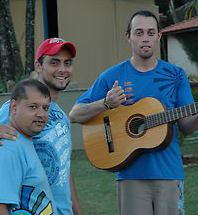Last April, three students were paired with the Opus Foundation to evaluate three humanitarian sites nominated for the Opus Prize and these students came back with much more than another stamp in their passports.

Junior Sahr Brima, senior Brady Narloch and MBA student Kateryna Grudkovska were nominated by St. Thomas to evaluate the sites. They were given the opportunity to individually travel to their assigned nominated site and evaluate the nominee based on Opus’ credentials.
The Opus Foundation honors faith-based entrepreneurs from around the world who are actively addressing social justice issues. Nominees have been narrowed down to just three with the first prize winner receiving $1 million and second and third place receiving $100,000. The 2009 Opus Prize will be presented at 8 p.m. Wednesday, Nov. 4, in Orchestra Hall in Minneapolis.
Information on the student’s nomination and expedition to the sites were kept secret until this fall.
Narloch was chosen for the Bogotá, Colombia site – Asociación Hogares Luz y Vida – which provides daycare for 850 disabled and handicapped children in the community.
Grudkovska traveled to Casablanca, Morocco where she explored the Association Solidarité Féminine, which gives knowledge to unmarried women with children about how to ensure their own livelihood.
Brima was assigned to do an evaluation in Guarantinguetá, Brazil. There he met with the Rev. Hans Stapel, the co-founder and president of Fazenda da Esperança – Farm of Hope – which helps alcohol and drug addicts rebuild their lives.
Brima’s ‘beautiful’ experience on the Farm of Hope
“We went to the site in Guaratinguetá and it was a farm,” Brima said. “Farm not in the sense of run-down, broken-down little houses. [It] was just this beautiful location and it’s part of the whole thing, the whole principles of recovery.”
The Farm of Hope houses addicts for a year as they make their way to recovery. More than 10,000 addicts have participated in the program and 80 percent have remained sober.
Within that year, the three principles of work, community and spirituality become major components of the participants’ lives.
“Getting there, I was struck by everyone,” Brima said. “I saw just this liveliness; their eyes bright, smiles, just this genuine love. Speaking to the members, the people going through this program … you work as well as take part of everything and I was struck by this genuineness and the way they accepted us.”
Participants attend Stapel’s daily Mass in hopes of reinvigorating their faith and “waking up God in them,” Stapel said.
A memorable encounter for Brima was a conversation he recalled having with a recovering drug addict.
“He came on with a goal of recovering, being a better man, being a better husband, being a better father,” Brima said. “Coming onto the farm, he was able to re-establish his relationship with God and it’s because of that that his heart has been changed from the inside out.”
Stapel’s farm has expanded into 10 countries
In 2007, the success of the farm brought Pope John Paul II to bless the site. The program has now extended to 10 countries and 60 communities, increasing Stapel’s ever-growing international popularity.
“It was amazing to me how this man was just so humble,” Brima said. “Even when we were eating dinner and he served everyone first before he served himself, he catered to all of us.”
Brima spent the past summer as a McNair scholar focusing his research on socio-economic inequalities and poverty in developing nations. He said he came back impassioned by his experience in Brazil.
“I came away and the one word that really sums it all up for me was this trip was affirming,” Brima said. “It showed me the power of faith, the power of prayer and the power of the gospel transform lives.”
As a Bible study leader on campus, Brima also said the trip has opened his heart and his mind to the expressions of his own faith.
“I meet a lot of people and I myself was like, ‘Yeah I’m a Christian, what do you do? How do you show that love that God has put in you?’” Brima said. “That’s something I have come away with and what I’ve tried to impart with other people.”
Kari Jo Johnson can be reached at kjjohnson@stthomas.edu



